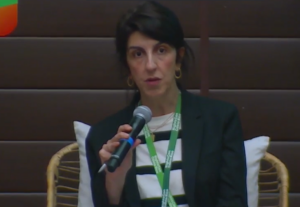The 12th edition of RightsCon, an important conference on human rights and technology, featured panels dedicated to press freedom where journalists from Latin America discussed the challenges they face in their profession.
After three virtual years, RightCon returned to a physical space and, on this occasion, the place chosen was Costa Rica. This conference aims to bring together all stakeholders — from technology companies to government representatives, journalists and human rights defenders — to build a rights-respecting digital future.
Costa Rica has become, in recent years, the host country for exiled Central American journalists. Journalists from Nicaragua, El Salvador, Guatemala and Honduras were featured on several panels during the four-day event held earlier this month.
One of them was the panel entitled 'Central American journalism under attack,' the only meeting on press freedom that was streamed in Spanish. Members of the recently created Central American Network of Journalists discussed the increasing attacks against independent journalism in Central America and the approaches they are jointly implementing to confront authoritarianism in their countries.

Members of the Central American Network of Journalists discussed the ways they are jointly implementing to confront authoritarianism and the increasing attacks against the press in their countries (Photo: Screenshot).
"I continue doing journalism because it’s a civic commitment and because I believe we can have a better country....When democracies are dilapidated, in Nicaragua it’s been demonstrated that the only thing left is journalism shedding light in the midst of so much deception," said Nicaraguan journalist Wilfredo Miranda Aburto, founder of Divergentes, who is exiled in Costa Rica.
Like many other Central American journalists, he has had to cope with the difficulties of continuing to work in exile. "While in exile, you lose direct contact with reality, personal things like family, friends... I have even lost my nationality. You lose that ability as a reporter to be on the street and in direct contact with people. Also, in exile you have to figure out how not to lose sensitivity to what is happening in your own country," Miranda Aburto said.
In El Salvador, the situation is equally concerning. Angélica Cárcamo, president of the journalists' association in El Salvador, summarized the situation of the press in her country: 11 journalists in exile due to legal reforms that criminalize journalists, independent news outlets that have had to transfer their legal structure to other countries as is the case of El Faro, the closure of two broadcast television channels due to economic asphyxia, etc.
"The only good thing that Nayib Bukele [current president of El Salvador] has done is that he has united us journalists and made us organize ourselves as a profession...we organized ourselves because we are under attack," Cárcamo said.
And Costa Rica, despite being the current refuge for Central American journalists, is far from being a model place to practice journalism. "We thought Costa Rica was bulletproof and that was a mistake. Costa Rica fell from 5th to 23rd place in the latest Reporters Without Borders report," said Álvaro Murillo, from Semanario Universidad in Costa Rica.
"We don’t know how to live under this reality of threats to the press. And in the face of this, what many news outlets are doing — from corporate leaders to journalists—, is self-censoring," Murillo added.
The 'Central American journalism under attack' panel closed with a conversation with José Carlos Zamora, journalist and son of imprisoned Guatemalan journalist José Rubén Zamora.
"This case is emblematic because it reflects a form of exemplary punishment that sends a message to the citizenry, journalists, communicators and the media that practicing a profession such as journalism, having a media outlet, writing news and covering cases of importance to the citizenry may be punished not only with jail, but with psychological torture and the closure of media outlets," said the founder of Prensa Comunitaria de Guatemala, Quimy De León, during the conversation.
Zamora took the opportunity to ask the international community to continue talking about cases like his father's and "to continue supporting journalists, prosecutors, honest judges with funds, protection, legal aid, visas, etc...".
He also thanked the synergy between Central American journalists who are collaborating more than ever to make this whistleblowing journalism. "The best condemnation for attacks is more and better journalism," he said.
Days after this conference, on June 14, José Rubén Zamora was sentenced by a Guatemalan court to six years in prison for the crime of alleged money laundering after almost a year of judicial proceedings.

Carlos Chamorro, founder of Nicaragua's El Confidencial, and Pablo Medina, disinformation editor of El Clip, talked about the opportunities and challenges of digital platforms (Photo: Screenshot).
Carlos Chamorro, founder of Nicaragua's El Confidencial, and Pablo Medina, disinformation editor of El Clip, participated in a panel discussing how technology can be leveraged to provide and access reliable information.
For Chamorro, the digital version of the newspaper and digital platforms such as Youtube or Facebook meant a salvation for El Confidencial, because at the beginning the attacks they received were physical (assaults and harassment to newsroom offices) and prevented the free circulation of the print version of the newspaper.
“The digital platform has given us several advantages to face censorship, but at the same time has created new problems [such] as polarization and disinformation,” Chamorro said.
Medina agrees with Chamorro that digital platforms provide both opportunities and challenges. The publisher explained that the main problem they have seen with their allies in other countries is that governments are increasingly trying to legislate around Latin America what can and cannot be said online. In addition, according to Medina, large technology companies do not prioritize supporting Latin America.

Paula Miraglia, founder of Nexo Journal from Brazil, participated in the panel ‘Sustainability and public interest: Developing remuneration models for journalism in the digital sphere’. (Photo: Screenshot)
This topic was also discussed in the session entitled 'Sustainability and public interest: Developing remuneration models for journalism in the digital sphere.' Paula Miraglia, founder of Nexo Journal from Brazil, emphasized that the big digital platforms and social media are not the only ones responsible for the bad situation the media currently face.
“To discuss sustainability is to discuss the quality of journalism and these two conversations must be tied together. We should acknowledge that this is an industry that has been very comfortable with the margins coming from advertisement and therefore has not pushed itself to innovate,” Miraglia said.
“Innovation has to be part of any industry and the media industry has not thought about digital transformation rapidly enough, seriously enough because it didn’t feel it was needed…I would not say the media industry is in bad shape only because of the platforms,” she said.